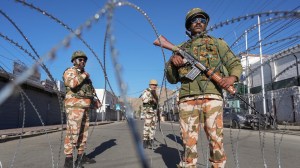Talking straight
This is a hectic and crucial phase in Indian diplomacy.
This is a hectic and crucial phase in Indian diplomacy. With Prime Minister Manmohan Singh hosting or visiting key G-7 leaders as well as conducting talks in East Asia,the shadow of China has often been projected on these efforts. There is a great and obvious danger in getting carried away by the impression that this diplomacy is energised by a desire to contain China,and not primarily by a set of bilateral agendas. News from Hanoi,therefore,that Dr Singh has elicited a tentative date from his Chinese counterpart,Wen Jiabao,to visit India this December allows clarity to Delhis overall diplomacy. First,the visit of the Chinese premier would give it a 360-degree completeness. Second,it would allow the two countries an opportunity to address the complexities of a unique relationship by a bilateral initiative. For reasons of geography and history,Delhi and Beijing deal with each other in a unique context and especially the complications in ties over the last year can be addressed only if they deal with each other directly. Simply put,Indias problems with China cannot be addressed by turning to other countries.
In the Hanoi meeting the point was made that the world is large enough for both countries to grow. If that determined the atmospherics,there was fortunately no obfuscation of the fact that the two countries have a complex set of issues to navigate. Dr Singh asked China to be sensitive to Indias core interests. In the past couple of years India has been particularly unsettled by the ways in which its territorial sovereignty has been questioned by references to Arunachal Pradesh and more lately by the practice of giving stapled visas to residents of Jammu and Kashmir. It is welcome therefore that the special representatives of both countries will lead a round of boundary talks after more than a year. Premier Wen has also said that China is conscious of the trade imbalance,and spoke of the need to reach consensus on some major aspects to lay a foundation for the visit. If that is an indication that the very serious problems between the two countries which also include rivalry in the Indian Ocean,the growing Chinese presence in Gilgit-Baltistan and issues that involve many of Indias neighbours will be taken up,it is a good sign. There is no question that India has to find ways of coming to terms with Chinas rise and being cast in some sort of rivalry. It is equally obvious that both countries need to cooperate to establish greater peace in the region to meet their high economic ambitions. The signs are healthy,that the two leaders see their forthcoming summit as a unique opportunity.







- 01
- 02
- 03
- 04
- 05
























